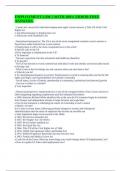EMPLOYMENT LAW || WITH 100% ERROR-FREE
ANSWERS.
- 3 main acts covered for individual employment rights correct answers o Title VII of the Civil
Rights Act
o Age Discrimination in Employment Act
o Americans with Disabilities Act
- International perspective: The US is one of the most unregulated countries correct answers o
Payed leave under Federal Law is non existent
o Employment at will is the most exceptional laws in the world
§ Specific only to the US
o How important is employment in the US?
§ To finances?
· Not just a paycheck, but also retirement and healthcare (benefits)
§ To psyche?
· The US has become so work centered that individual worth and identify are inextricably bound
in having a job
· What is one of the first things you ask a person when you meet him or her?
o What do you do?
§ To citizenship/participation in society? Employment is crucial to ensuring that one has the full
rights, privileges, and responsibilities of economic citizenship
· Social status, circles of friends, membership in community, professional and personal growth
· Are you a worker or a shirker?
§ Very important
- Historical perspective: employment law is one of the youngest bodies of law correct answers o
Didn't beginning regulating employment until the Industrial Revolution
o 1868- historian Richard White identifies this as the year the US economy began its transition
from farmers and independent artisans to large factories and wage labor
o Part of that transition is redefining the nature of citizenship in such a nation
o Master- servant?
§ It is only in recent times, following profound changes in society and widespread
industrialization that the status of employee has become an enviable one
o State legislation began to be enacted in the 1840s
§ 1932- the Norris-LaGuardia Act
§ 1935- the Wagner Act- the NLRA
§ 1938- the fair labors standard act
§ 1963- the Equal Pay Act
§ 1964- Title VII of the Civil Rights Act of 1964
§ 1970- OSHA (Occupational Safety and Health Act)
§ 1974- ERISA (Employee Retirement Income Security Act)
§ 1993- Family and Medical Leave Act
o Look for on the Exam: What are some things you would change about US Employment Law?
o How to explain US Labor and Employment Law?
,§ At the end of the 12th Century, the body of law of employment in the US has evolved to a
scarcely rational patchwork. It is comprehensible as a whole if at all, only when viewed through
the lens of its history
- Why do we regulate employment by law? correct answers o Libertarian approach- government
should regulate as little as possible
o Management perspective- employees do no own the capital and means of production
o Why not just let employers regulate themselves?
o Who do businesses serve? Who are their stakeholders?
§ Customers
§ Shareholders
§ Employees
- How effective are our labor and employment laws in a crisis? correct answers o During the
recession in 2007 and following?
§ E.g. work sharing arrangements
o During the COVID-19 pandemic of 2020 and following?
§ E.g., leave laws- created more paid leave
§ E.g., sources of income for unemployed- stimulus checks
§ E.g., coverage of workers other than employees- more coverage for independent contractors
who needed help
- Cradle to grave employment laws correct answers o While we have a lot of employment laws,
does not mean that they provide coverage
- Median tenure in jobs- BLS correct answers o The median number of years that wage and
salary workers had been with their current employer was 4.1 years in January 2020. It was 4.2
years in 2018
o Major occupations, workers in management, professional, and related occupations had the
highest median tenure (4.9 years)
o Workers in service occupations who are generally younger that persons employed in
management, professional, and related occupations had the lowest median tenure (2.9 years).
Among employees working in service occupations, food service workers and the lowest mediate
tenure at 1.9 years
- What employment do we regulate by law? correct answers o What kinds of employees?
§ Full-time vs. part-time
§ Hourly wage vs. salary
§ Baseball platers vs. CEOs vs. fast food workers
o Are there employees who do not need much, if any legal protection?
- Employees and coverage correct answers o Most statutes define employee for purpose of
coverage
o Among workers, there are employees, volunteers, independent contractors, and other
classifications
o The advent of the gig economy
,o Our laws are not written to deal with much of the contemporary workforce - contingent or
atypical labor
o What of telework? What issues does telework present?
- Employment Law correct answers o Employment at will, contracts: formation and termination,
torts, employee or workplace privacy (or autonomy), FLSA, FLMA, OSHA, ERISA, etc.
o Employment laws vs. labor market
§ Labor market controls many things
o Immutable vs. default rules
§ Most federal and state minimum rights employment laws are immutable rules rather than
default rules
· Limiting to what you have to do for immutable rules
§ Default rules can provide bargaining leverage
· If Congress did default rules for x number of paid weeks, it could be better because it is not an
absolute obligation
· Congress and state legislators may feel better to do this, but it is hard to give employees the
power to bargain
§ Why do we enact rules?
§ Do we have any examples of default rules in employment law?
· Employment at will, but...
o There are exceptions: collective bargaining, civil employees, and professors
o Many employers don't want to negotiate employment at will, usually don't bargain about that
· Noncompete
o Basic law: can compete with your employer after you leave unless you sign a noncompete
o Very common, signed by many employers
o A lot of times, if you don't sign it, you don't get the job, employers want to negotiate
· Mandatory arbitration agreements
o Part of an agreement to purchase a service
o Usually employers will not give you the job if you don't sign this
· a lot of push and pull and between default and immutable rules
- COVID-19 correct answers -
o What will be the enduring changes in the world of work in the aftermath of the pandemic?
§ Employer authority- e.g. mandatory vaccinations, mandatory health screenings
§ In the US as a product of our state and federal government we have a big difference between
public sector employees and private sector employees
o Remote work
§ What changes if day-to-day social interaction of work is lost?
· A lot of jobs would be lost
o What types of jobs will be lost?
§ Businesses that depend on high levels of in-person traffic
· Jobs with a concentration of people in a downtown area
o Ex: coffee shops, restaurants downtown
§ A full one-in-four workers are in the transportation, food service, cleaning and maintenance,
retail and personal care industries. These jobs, often concentrated in cities and lower paid are
disappearing or are of risk of disappearing in the near term
, o More government intervention and regulation of employment unwillingness to leave it to the
market
§ Government will become more engaged
o In one always at work or on call now?
§ More availability of workers at all time
§ Concern with separation of work and nonwork
§ Harder to regulate the home when people are working from home if home is the workplace
o The coming recession?
o The end of business travel
§ There will no longer be a lot business travel
o More data collection and electronic monitoring of employees by employees
§ Monitoring already exists, but more computer monitoring may come about
§ If working from home more, would have to engage in electronic monitoring more
- The glory of remote work correct answers o Is remote working overhyped?
§ The work place is a social environment and business in any form is a social phenomenon
§ We have been in the midst of a loneliness epidemic among the 20-something for the better part
of the last two decades. It is a particular problem for young new graduates moving to an
unfamiliar city on their first job. With no family or friends nearby, work is the only place they
can find friends and arrange social events.
§ Third, the digital world of Zoom and Skype is no substitute for face-to-face meetings. It is easy
to hide away reading your emails and newsfeed. People find the virtual environment awkward
and very quickly get bored. There is a very strict limit on the size of natural conversations of four
people.
- Organizing themes of the book correct answers o Appropriate blend of economic incentives and
legal regulation
§ People say the market drives decisions, employers will do what they have to
§ Should Congress raise the minimum wage
· Could destroy certain amount of jobs
o Authority in workplace—in US, overwhelming employer
§ Vast amount of authority in the US by employers
o Simple and effective rules—tension
§ Most employees know very little of employment regulation
§ Complex rules are likely more effective
· but people need to know what those rules are
o Structure of legal responses to problems
§ Level of government
· Congress doesn't like to take certain rights away from states
· Employment at will: Congress doesn't want to take that power away from state
§ Adjudicatory and enforcement mechanisms
§ Type of regulation—positive law v. case law
o Best enforcement mechanism
§ Herein of substance and procedure
o Boundaries of employment law—coverage issue





